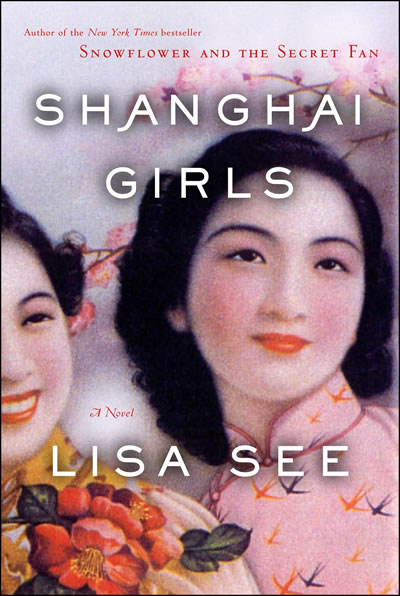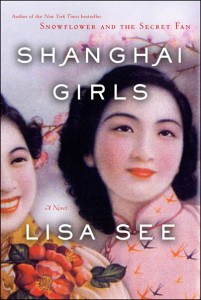To dismiss Shanghai Girls, with its flowery, pink-tinged cover, as “women’s fiction” or even as a light summer read belies the very serious nature of author Lisa See’s ambitious novel. What starts as an amusing tale about two young women — sisters Pearl and May — frolicking through bohemian Shanghai, posing for paintings in their new silk gowns, and wondering which of them is prettiest, turns sinister quite quickly. The violence that engulfs China with the advent of World War II parallels the violence that they experience when they truly begin to understand their status as women. They are bargaining chips for their father, who has traded them away in arranged marriages to pay off his debts. They are targets for prowling Japanese soldiers. And when they come through these struggles with the scars to prove it, they become workhorses and, hopefully, son-producers for their shared father-in-law in America (they’re paired off with brothers in arranged marriages), although eventually, they form real family ties with the husbands they’ve been bound to on paper.
From escaping the shelling of a fashionable Shanghai street, to crouching in abandoned shacks as they listen to soldiers on the march committing murder, to tossing and turning on their long trans-Pacific journey, to sitting stoically through endless interrogation as they try to enter this country, the sisters endure atrocities and privation. But perhaps the most compelling aspect of their story is its deviation from the “immigrant-family-makes-good” cliché. Try as they might — and they do try — Pearl, May, their husbands, and even a college-bound daughter are never quite accepted into mainstream American society. In fact, as the story draws to a close, they’re being interrogated by the FBI for alleged communist ties, with calamitous results.
See, the daughter of novelist Carolyn See, is a Chinese American herself who has devoted much of her work — including Snow Flower and the Secret Fan (2005) and Peony in Love (2007) — to exploring Chinese culture and history. As we follow Pearl and May’s journey in Shanghai Girls, See tells dozens of historical stories that illuminate the struggles of her characters. One of these stories captures the glamour and excitement of prewar, pre-Communist Shanghai, full of smoky cafés, artists, radicals, and beautiful women. There are also incredibly dark stories about the Japanese invasion of China, the fate of immigrants stalled in limbo at California’s notorious Angel Island, the endless striving of immigrant families once they reached these shores, and the endless discrimination that met them here. There’s even a story about the way Hollywood treated Asian characters and actors (not very well, needless to say).
But the sweeping narrative is anchored by the intimacy of the two women. Together throughout all their trials and tribulations, Pearl and May are classic fictional sisters — both unimaginably close and fearfully jealous. “She’s funny; I’m criticized for being too serious. She has an adorable fleshiness to her; I’m tall and thin,” Pearl, the narrator, explains in her staccato, singsong tone.
She’s convinced that she’s the sister everyone thinks is inferior, the sister who has borne the most burdens over time. After their family suffers a horrific wartime trauma on the road out of Shanghai, Pearl’s resentment of her sister simmers beneath the surface for decades, even if she and May continue to stick together and even adore each other. But in the course of several knock-down, drag-out fights between the sisters, See suddenly, like a flash of light, switches to May’s point of view. “You’ve always been jealous and envious of me, but you were the one who was cherished by Mama and Baba,” May says to her sister in one of the novel’s final scenes. When she speaks, it’s sure to put a wrinkle or three in Pearl’s version of the truth.
Even though May’s final revelation of a long-kept secret is ultimately predictable, the sisters’ dueling outlooks create tension when the plot slows down, and their ability to reconcile and forge on together provides a ray of hope. “Parents die, daughters grow up and marry out, but sisters are for life,” Pearl explains.
See — whose copious acknowledgments at the end of the book confirm her considerable research — arrives at an uncomfortable truth about the American past. America, she shows, hasn’t simply laid out its golden-hued dream at the feet of hardworking newcomers. Those who work double shifts and play by the rules don’t (and didn’t) necessarily end up in the house with the white picket fence, particularly if they look too different or are plagued by cruel stereotypes. But to her credit, See also infuses Shanghai Girls with a positive message about forgiveness and the way friendship and family can help us pick ourselves back up even after the worst has happened.
UPDATE, 3/8/13: Edited and moved story from our old site to the current one.
- Follow us on Twitter: @inthefray
- Comment on stories or like us on Facebook
- Subscribe to our free email newsletter
- Send us your writing, photography, or artwork
- Republish our Creative Commons-licensed content


